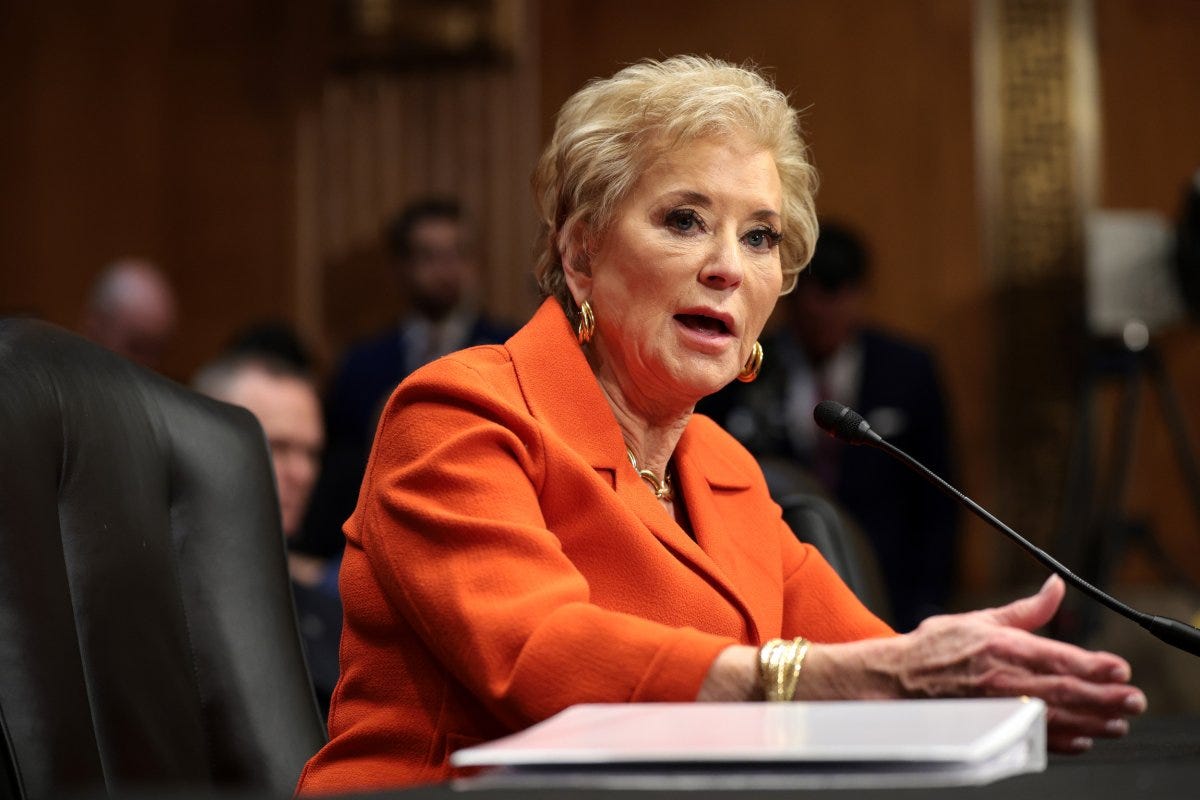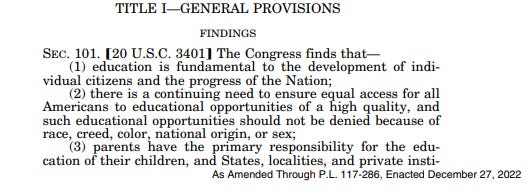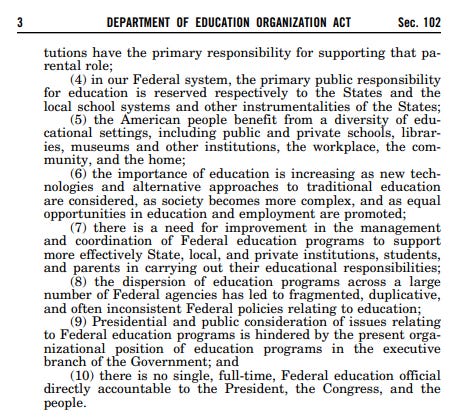by Kathy Faucher and Sue Greenwald M.D.
Secretary Linda McMahon, photo credit: newsweek.com/Win McNamee/Getty Images
The ancient proverb –The road to hell is paved with good intentions – imparts the perfect warning to our 21st-century policymakers who design, implement and approve spending for government programs.
If you are reading this article, you likely have an interest in – and maybe an intense concern about – education policy. This means you are well aware of the mantra “we have to do better, and spend more, for the kids.” This is a constant refrain made to appeal to taxpayers’ and lawmakers’ heartstrings, and to justify “whole child” programs that come at extreme costs with no measurable outcomes. “Whole child” serves as the umbrella for a number of programs that meddle in the culture, religious views, mental health, and sexual mores of students.
The runaway spending in education, though arguably well intended, has resulted in these controversial educational initiatives gaining immense traction in the early 2000s. What started with Common Core during the Obama years, has continued through both Republican and Democrat administrations, and was finally brought to light during COVID lockdowns. Restorative Justice, Social Emotional Learning, Multi-tiered Systems of Support (MTSS), and Whole Language Learning are examples of mandates, endorsements and frameworks still coming down the pipe from the US Department of Education to the states and local school districts. These ambitious programs continue to undermine the very decrees outlined for justifying the existence of the federal Department: To support parents as the primary educators of their children. https://www.govinfo.gov/content/pkg/COMPS-726/pdf/COMPS-726.pdf.
These are the provisions as laid out by the Jimmy Carter administration in 1979, while forming the US Department of Education.
Of note is number (3) parents have the primary responsibility for the education of their children, and States, localities, and private institutions have the primary responsibility for supporting that parental role;
Also numbers (4) in our Federal system, the primary public responsibility for education is reserved respectively to the States and the local school systems and other instrumentalities of the States; and (5) the American people benefit from a diversity of educational settings, including public and private schools, libraries, museums and other institutions, the workplace, the community, and the home;
It looks like the 1979 version of the US Department of Education was in favor of parental rights, state sovereignty and home schooling. My, how things have changed.
Jimmy Carter is said to have signed this bill as a payback to the teachers’ unions who got him elected. But he didn’t do that until he was on his way out of office. Ronald Reagan made a campaign promise to get rid of the Department, but he failed, as has every Republican President since then, all of whom made the same promise.
If you graduated before the 1980’s, you most likely had a great education in public school. Since then, things have gone downhill in many districts.
During the Biden administration, federal funds were tied to the acceptance of Social Emotional Learning (aka DEI training), queer theory, and all of the other Marxist- NGO favored programs under the “Whole Child” umbrella.
The new Department of Education Secretary is Linda McMahon. She, and the new President, are not having it. They plan to return to a state grant system that allows the states to determine their own priorities, just as it was before 1980.
Please read the short press release from the US Department of Education (published May 20, 2025) on Supplemental Grant Priorities: https://www.ed.gov/about/news/press-release/us-department-of-education-releases-secretary-mcmahons-supplemental-grant-priorities. (It is only 2 pages, seriously, read and download it.)
Secretary McMahon lays out her three priorities:
Evidence-Based Literacy based upon the “science of reading,” which includes phonics. We have previously addressed this topic HERE and HERE. The Nebraska Department of Education has designated literacy as their number one priority already.
Expanding Educational Choice:
“Options include expansion of charters, innovative school models, K-12 open enrollment, dissemination of information on choice options, implementation of ESAs, home based education, concurrent enrollment programs, career preparation, postsecondary distance education, skills-based education, apprenticeships, work-based learning, accelerated learning and tutoring, etc.”
Returning Education to the States:
“This priority will have the broadest applicability across grant programs. It will serve as a powerful tool to re-envision existing programs, reduce administrative burdens at the Department, and demonstrate that states are best positioned to manage these programs.”
In this press release, the Department announces,
Discretionary grants coming from the Department of Education will now be focused on meaningful learning and expanding choice, not divisive ideologies and unproven strategies.” U.S. Secretary of Education Linda McMahon states: “It is critical that we immediately address this year’s dismal reading and math scores by getting back to the basics, expanding learning options, and making sure decisions in education are made closest to the child.”
The press release from the Department signals that Diversity, Equity and Inclusion (DEI) initiatives in schools will be stripped of federal funding, as the agency focuses on its priorities once they are approved. Remember, much of the most recent DEI-related funding for education came from federal Elementary and Secondary School Emergency Relief (ESSER) funding during the pandemic. These dollars have dried up, and so should the failed programming.
Under the Biden Administration, says McMahon, priorities focused around “divisive race stereotypes and even racial quotas.” Examples included:
Pushing student racial diversity through diversity plans, admissions policies, and technical assistance;
Embedding DEI in educational subjects and programs such as civics, STEM, and career and technical education;
Focusing on diversity amongst educators instead of sound teacher preparation;
Promoting social emotional learning; and
Supporting divisive school diversity and social justice policies.
To quote Defense Secretary Pete Hegseth: “We are done with that shit.”
This is the time to make your voice heard, and to contribute to the sentiment that will solidify the US Department of Education’s decision. The department wants to alter priorities to acknowledge parental rights and choices, and prioritize literacy over social engineering. These priorities are pushed down to school funding and ultimately programs and lessons that will be adopted by schools.
Whether or not you work in education, you are a stakeholder. You pay taxes that fund the schools. You may have children in your family that attend the schools. You may have a story to tell about government overreach in your school, a failure to adequately teach children in your community to read, or a positive story about programs that you have experienced that actually work and produce educated, competent, exuberant students.
Please set some time aside before June 20, 2025, and take action.
Go to the Federal Register and comment:
https://www.regulations.gov/document/ED-2025-OS-0020-0001
Click the blue box that says COMMENT
“From now through June 20, provide your public comment on the Department’s proposed priorities under the Trump administration: evidence-based literacy, expanding education choice, and returning education to the states. Click on the Comment button at the top of the Federal Register website to submit your comments. You can also upload attachments. After clicking on the Comment button, you can click on the Commenter's Checklist for tips on submitting a public comment.”
Next, share this article with a concerned friend, and ask them to also submit their comments. Sharing is free, and easy.
Secretary McMahon thanks you for your commitment to the American education system, and so do we.
The Authors Represent the Nebraska Education Coalition






